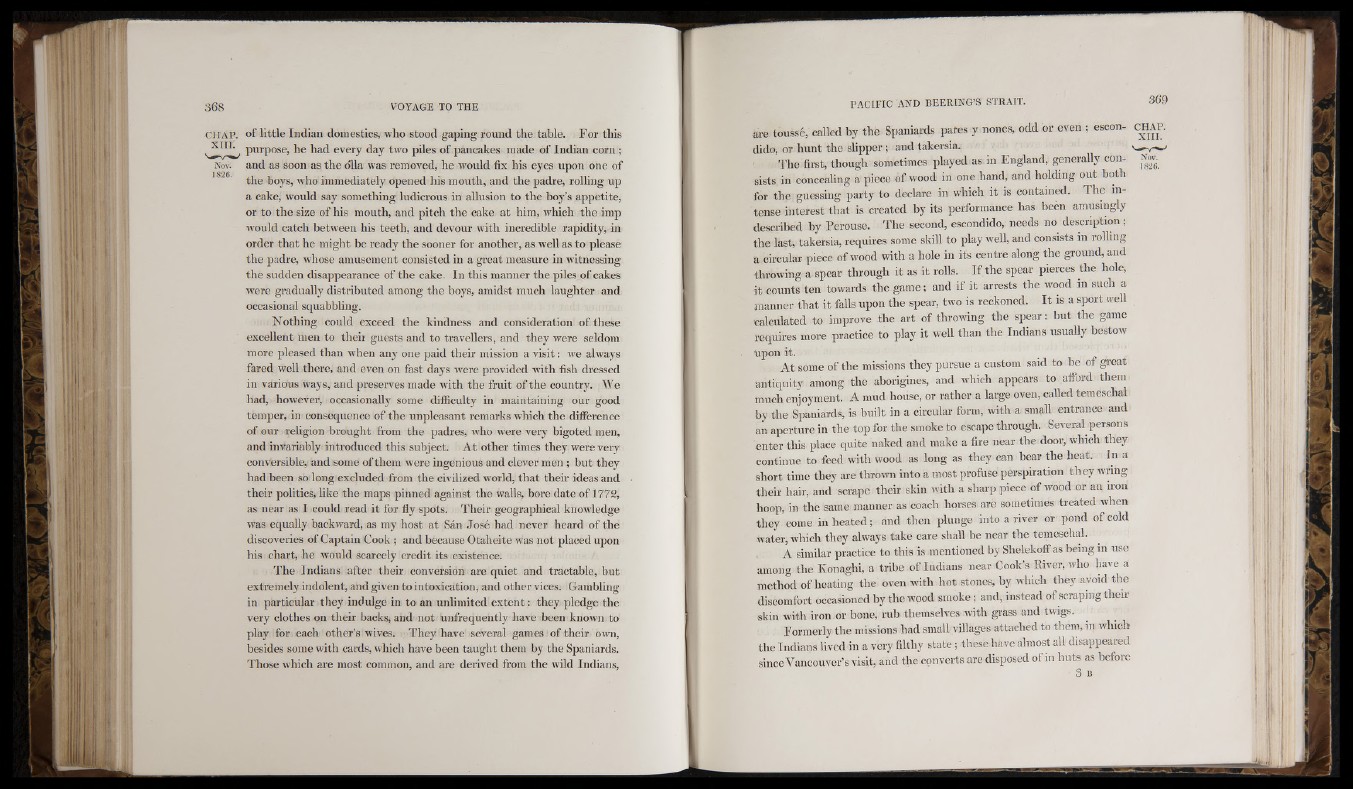
C H A P . of little Indian domestics, who stood gaping round the table. For this
7 1 7 P'H'PO*®. 1'® every day two piles of pancakes made of Indian corn ;
Nov. and as soon as the dlla was removed, he would fix his eyes upon one of
the boys, who immediately opened his mouth, and the padre, rolling up
a cake, would say something ludicrous in allusion to the boy’s appetite,
or to the size of his mouth, and pitch the cake at him, which the imp
would catch between his teeth, and devour with incredible rapidity, in
order that he might be ready the sooner for another, as well as to please
the padre, whose amusement consisted in a great measure in witnessing
the sudden disappearance of the cake. In this manner the piles of cakes
were gradually distributed among the boys, amidst much laughter and
occasional squabbling.
Nothing could exceed the kindness and consideration of these
excellent men to their guests and to travellers, and they were seldom
more pleased than when any one paid their mission a visit ; we always
fared well there, and even on fast days were provided with fish dressed
in various ways, and preserves made with the fruit of the country. AVe
had, however, occasionally some difficulty in maintaining our good
temper, in consequence of the unpleasant remarks which the difference
of our religion brought from the padres, who were very bigoted men,
and invariably introduced this subject. At other times they were very
conversible, and some of them were ingenious and clever men ; but they
had been so long excluded from the civilized world, that their ideas and
their politics, like the maps pinned against the walls, bore date of 1772,
as near as I could read it for fly spots. Their geographical knowledge
was equally backward, as my host at Sán José had never heard of the
discoveries of Captain Cook ; and because Otaheite was not placed upon
his chart, he would scarcely credit its existence.
The Indians after their conversion are quiet and tractable, but
extremely indolent, and given to intoxication, and other vices. Gambling
in particular they indulge in to an unlimited extent: they pledge the
very clothes on their backs, and not unfrequently have been known to
play for each other’s wives. They have several games of their own,
besides some with cards, which have been taught them by the Spaniards.
Those which are most common, and are derived from the wild Indians,
are toussé, called by the Spaniards pares y nones, odd or even ; escon- CHAP.
dido, or hunt the slipper ; and takersia. .— ,— .
The first, though sometimes played as in England, generally con- Nov-
sists in concealing a piece of wood in one hand, and holding out both
for the guessing party to declare in which it is contained. The intense
interest that is created by its performance has been amusingly
described by Terouse. The second, escondido, needs no description ;
the last, takersia, requires some skill to play well, and consists in rolling
a circular piece of wood with a hole in its centre along the ground, and
throwing a spear through it as it rolls. If the spear pierces the hole,
it counts ten towards the game; and if it arrests the wood in such a
manner that it falls upon the spear, two is reckoned. It is a sport well
calculated to improve the art of throwing the spear; but the game
requires more practice to play it well than the Indians usually bestow
upon it.
At some of the missions they pursue a custom said to be of great
antiquity among the aborigines, and which appears to afford them
much enjoyment. A mud house, or rather a large oven, called temeschal
by the Spaniards, is built in a circular form, with a small entrance and
ail aperture in the top for the smoke to escape through. Several persons
enter this place quite naked and make a fire near the door, which they
continue to feed with wood as long as they can bear the heat. In a
short time they are thrown into a most profuse perspiration they wring
their hair, and scrape their skin with a sharp piece of wood or an iron
hoop, in the same manner as coach horses are sometimes treated when
they come in heated; and then jilmige into a river or pond of cold
water, which they always take care shall be near the temeschal.
A similar practice to this is mentioned by Sbelekoff'as being in use
among the Konaghi, a tribe of Indians near Cook’s River, who have a
method of heating the oven with hot stones, by which they avoid the
discomfort occasioned by the wood smoke ; and, instead of scraping their
skin with iron or bone, rub themselves with grass and twigs.
Formerly the missions had small villages attached to them, in which
the Indians lived in a very filthy state ; these have almost all disappeared
since A"ancouver’s visit, and the converts are disposed of in huts as before
3 B
k
l l